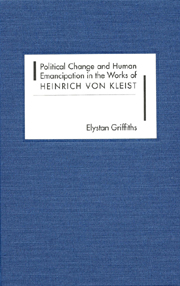Book contents
- Frontmatter
- Contents
- Acknowledgments
- A Note on Translations and Publication Dates
- Abbreviations
- Introduction
- 1 Prussia and Germany in Kleist's Day
- 2 Kleist and the Political World
- 3 The Nation, the State, and the Subject
- 4 Education and Social Change
- 5 The Theory and Practice of War
- 6 Administration and Justice
- Conclusion
- Works Cited
- Index
3 - The Nation, the State, and the Subject
Published online by Cambridge University Press: 05 February 2013
- Frontmatter
- Contents
- Acknowledgments
- A Note on Translations and Publication Dates
- Abbreviations
- Introduction
- 1 Prussia and Germany in Kleist's Day
- 2 Kleist and the Political World
- 3 The Nation, the State, and the Subject
- 4 Education and Social Change
- 5 The Theory and Practice of War
- 6 Administration and Justice
- Conclusion
- Works Cited
- Index
Summary
Kleist's early letters bear witness to his engagement with questions surrounding forms of statehood and their relationship to national culture and to the individual. His break with the army in 1799 was prompted by what was essentially a moral judgment: that the ethos of the army prevented him as an individual from conducting himself according to his own insights as a rational being. Kleist criticized the absolutist state for its functionalization of the individual, and for similar reasons he was loath to accept a position within the bureaucratic structure supporting absolutism. The experience of living in Berlin and Paris led Kleist to develop a critique of both national cultures and to highlight the inhuman aspects of both environments. But his attempt to turn away from the civilized world and escape into an idyllic, supposedly natural existence in Switzerland also failed following Napoleon's military intervention, and forced Kleist to acknowledge that the political world could not be avoided. In later years, as Napoleon extended his power over the European continent, the impossibility of escaping politics was to become an important theme of Kleist's work.
As we saw previously, the French Revolution and the hegemony of Napoleonic forces in Europe had forced Prussian politicians to reflect critically on the weaknesses of the absolutist state, and prompted them to make proposals for reform that sought to establish a direct connection between the aims of the state and the interests of the individual.
- Type
- Chapter
- Information
- Publisher: Boydell & BrewerPrint publication year: 2004



